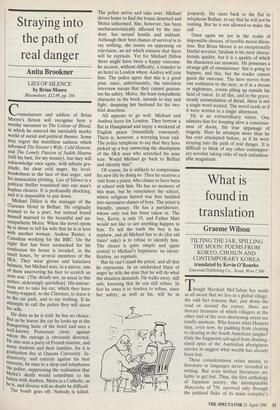Straying into the path of real danger
Anita Brookner
LIES OF SILENCE by Brian Moore
Bloomsbury, f12.99, pp. 194
Connoisseurs and addicts of Brian Moore's fiction will recognise here a worthy successor to The Colour of Blood, in which he entered the inevitably murky world of social and political themes. Some may regret the matchless sadness which Informed The Doctor's Wife, Cold Heaven, and The Lonely Passion of Judith Hearne (still his best, for my money), but they will acknowledge once again, with infinite gra- titude, his clear cold anger, his level- headedness in the face of that anger, and his immaculate plotting. Lies of Silence is a political thriller translated into one man's hapless choices. It is profoundly shocking; and it is impossible to put down.
Michael Dillon is the manager of the Clarence Hotel in Belfast. He originally wanted to be a poet, but instead found himself married to the beautiful and un- sYmpathetic Moira. When the novel opens he is about to tell his wife that he is in love with another woman, Andrea Baxter, a Canadian working for the BBC. On the night that has been earmarked for his confession his house is invaded, in the small hours, by several members of the IRA. They wear gloves and balaclava helmets, but Michael sees, in a mirror, one of them uncovering his face to scratch an acne scar. (The details are, as usual in this author, sickeningly quotidian). His instruc- tions are to take his car, which they have booby-trapped, to the Clarence, to leave it In the car park, and to say nothing. If he attempts to call the police they will shoot his wife.
He does as he is told: he has no choice. But as he leaves the car he looks up at the Banqueting Suite of the hotel and sees a well-known Protestant cleric, against whom the outrage is obviously directed. He also sees a party of French tourists, and many students and their families, for it is graduation day at Queens University. In- stinctively, and entirely against his best Interests, he runs to a shop and telephones the police, suppressing the realisation that Moira's death would contribute to his future with Andrea. Moira is a Catholic, as he is, and divorce will no doubt be difficult.
The bomb goes off. Nobody is killed. The police arrive and take over. Michael drives home to find the house deserted and Moira unharmed. She, however, has been uncharacteristically affected by the inci- dent, has turned hostile and militant. Although their best chance of survival is to say nothing, she insists on appearing on television, an act which ensures that there will be reprisals. Yet for Michael Dillon there might have been a happy outcome: he secures, without difficulty, a transfer to an hotel in London where Andrea will join him. The police agree that this is a good plan, since, unfortunately, the television interview means that they cannot guaran- tee his safety. Moira, the least sympathetic character in the book, intends to stay and fight, despising her husband for his two- fold desertion.
All appears to go well. Michael and Andrea leave for London. They borrow a flat in Hampstead and enjoy a weekend of English peace (beautifully conveyed). There is, however, a worrying loose end. The police telephone to say that they have picked up a boy answering the description of the IRA man who scratched his acne scar. Would Michael go back to Belfast and identify him? Of course, he is unlikely to compromise his new life by doing so. Then he receives a visit from a priest, who claims to have been at school with him. He has no memory of this man, but he remembers the school, where religious hatred was first instilled into successive classes of boys. The priest is friendly, uneasy. He has a parishioner, whose only son has been taken in. The boy, Kevin, is only 19, and Father Matt would not like to see anything happen to him. To tell the truth the boy is his nephew, and all Michael has to do (for old times' sake) is to refuse to identify him. The choice is quite simple and again central to Michael's happiness: no identi- fication, no reprisals. But he can't stand the priest, and all that he represents. In an unchecked blaze of anger he tells the man that he will do what the situation demands. He walks away, still safe, knowing that he can still refuse. In fact he owes it to Andrea to refuse, since her safety, as well as his, will be in jeopardy. He races back to the flat to telephone Belfast, to say that he will not be coming. But he is not allowed to make the call . . .
Once again we are in the realm of impossible choices, of terrible moral dilem- mas. But Brian Moore is an exceptionally fateful novelist; fatalism is his most charac- teristic quality, but it is a quality of which his characters are unaware. He possesses a strange gift of omniscience: this is going to happen, and this, but the reader cannot guess the outcome. The hero moves from one confusion to the next, as if in a dream or nightmare, events piling up outside his field of vision. In all this, and in the grave, steady accumulation of detail, there is not a single word wasted. The novel reads as if it were written in a single afternoon.
He is an extraordinary writer. One admires him for keeping alive a conscious- ness of doom, the true appanage of tragedy. Here he attempts more than he has ever attempted before, as if he were straying into the path of real danger. It is difficult to think of any other contempor- ary novelist taking risks of such unfashion- able magnitude.


















































 Previous page
Previous page